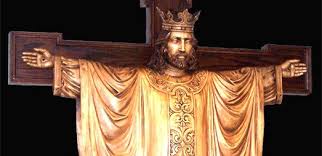 Bolivar, Missouri Thursday, November 18, 2021 Christ the King – part 4 John 18:33-37 John 18:33-37 Pilate entered the headquarters again, summoned Jesus, and asked him, “Are you the king of the Jews?” Jesus answered, “Did you ask this on your own, or did others tell you about me?” Pilate replied, “I am not a Jew, am I? Your own nation and the chief priests have handed you over to me. What have you done?” Jesus answered, “My kingdom is not from this world. If my kingdom were from this world, my followers would be fighting to keep me from being handed over to the Jews. But as it is my kingdom is not from here.” Pilate asked him, “So you are a king?” Jesus answered, “You say that I am a king. For this I was born, and for this I came into the world,,,,, to testify to the truth. Everyone who belongs to the truth listens to my voice.” Note: When John has Jesus say, “My kingdom is not from this world,” he refers to its origin, not to its scope. Do not imagine that Christ’s kingship is an abstraction from the here and now, or from earthly politics. The kingdom that comes from God is in stark contrast with, and in opposition to, any political entity that does not reflect the values and love of God. There are political systems in this world, as in Jesus’ time, and in Daniel’s, that inflict state terror, domination and persecution on its dissenting members. Someone commented this morning, on another page, that “Churches should stay out of politics.” The author was referring to the egregious displays of Trump-loyalty equated with Christian faith that have popped up in recent years, including the “rally” inside a Sunday worship service last week, where participants were urged to respond to the pastor’s shouting, “Let’s go Brandon” – a slur against President Biden. A wise response was: “Well, yes. But everything is political. They should definitely begin by talking about the real King, the Lord Jesus, Son of God, whose “political” words and actions on behalf of the poor, immigrants, women and children, outsiders and even enemies led to his death and run counter to those unbiblical ones.”  What Kind of King? (Hymn 382) King of glory, King of peace, I will love thee; and that love will never cease, I will move thee. Thou hast granted my request, thou hast heard me; thou didn’t note my working breast, thou hast spared me. Wherefore with my utmost art, I will sing thee; and the cream of all my heart, I will bring thee; though my sins against me cried, thou didst clear me; and alone, when they replied, thou didst hear me. Seven whole days, not one in seven, I will praise thee; in my heart, though not in heaven, I can raise thee. Small it is in this poor sort to enroll thee; e’en eternity’s too short to extol thee. George Herbert (1593-1633) Herbert followed his father into parliament, but became a priest in 1629, and served a small rural parish, where he lived with his wife and adopted children until he died of tuberculosis. He sent his poems to his friend, Nicholas Ferrar, with instructions to keep them if they might be helpful to others, and if not, to burn them. Fortunately for us, his devotional poetry was preserved. What’s not in the reading All four gospels report that at Jesus’ crucifixion, Pilate had an inscription placed on the cross above Jesus’ head that read: “Jesus of Nazareth, King of the Jews” What exactly Pilate thought he was doing is open to question, perhaps he was mocking the religious leaders who were so afraid of Jesus; maybe he was mocking Jesus himself; and possibly he was moved by his own fear to acknowledge the one who so fascinated him. This is his enthronement. This is where we see what kingship means to Jesus. This is why in our large cross, the Christus Rex (Christ the King) at the front of the Church, we see Jesus on the cross, but crowned. It is my favorite of all images of the crucifixion, and of Jesus’s royal throne. Very often art shows us what words can’t. And more often than not, it is story, song, art, poetry, that open up the biblical realities to us so that we can see their depths. Of course “king” is a metaphor. But it is also the truth. and governor, or president don’t work: those are elected offices, and any office holder can be unelected. No one holding any governorship or presidency can ever actually represent the whole nation, standing above and outside of the secular political arena. Only a real King (or Queen) can do that, and be the very image of what it means to be – English, or Christian. Elizabeth II does. And the Lord Christ does. Anti-Semitism in John Let’s take just a moment to observe that the Gospel of John, including the crucifixion narrative has been used quite consciously to fire up Christians against Jews. “Jews are Christ-killers.” “Jews are responsible for the death of Jesus.” Pilate says, “Your own nation and the chief priests have handed you over to me” and Jesus says, “If my kingdom were from here my followers would be fighting to keep me from being handed over to the Jews” This is the basis for a good deal of Christian semi-conscious or unconscious anti-semitism which makes it easy for men like Hitler to rile up a people against Jesus’ own people against his own cultural and religious identity. But it can’t have been what John intended, either. John knew perfectly well that Jesus was a Jew, and that all of his first followers were. But it was also true that the Jewish leadership, including the chief priests and the scribes, were forever critiquing Jesus and his ministry. Ordinary Jews were not Jesus’ enemies, but his champions. And not everyone in leadership hated him, either, but they did seem to fear Jesus’ influence with the “rabble” the common people, and the worst thing they could imagine was for a riot to break out in Jerusalem against Roman rule. They knew what that would provoke. And their own images of the “melech”, the king (as in Daniel) or the messiah to come, were drawn from their own scriptural stories of King David and others. The threat of violence at the appearance of someone claiming to be the “king of the Jews” in the midst of Roman uneasiness was great. That is what John knew, years later when he wrote this narrative. We sometimes read this narrative as, “my follower would fight to keep me from being handed over to the Jewish leaders.” But we must be exceptionally careful to distance ourselves from any blanket condemnation of Jews, or Judaism; we need to be careful not to accept any theology that suggests that Judaism has been supplanted or replaced by Christianity, or that Jews have been rejected by God for not becoming Christians. We know exactly what that kind of theology has led people to do “in the name of God.” And it is still alive in our country and within many churches. |

Categories:
Tags:
No responses yet